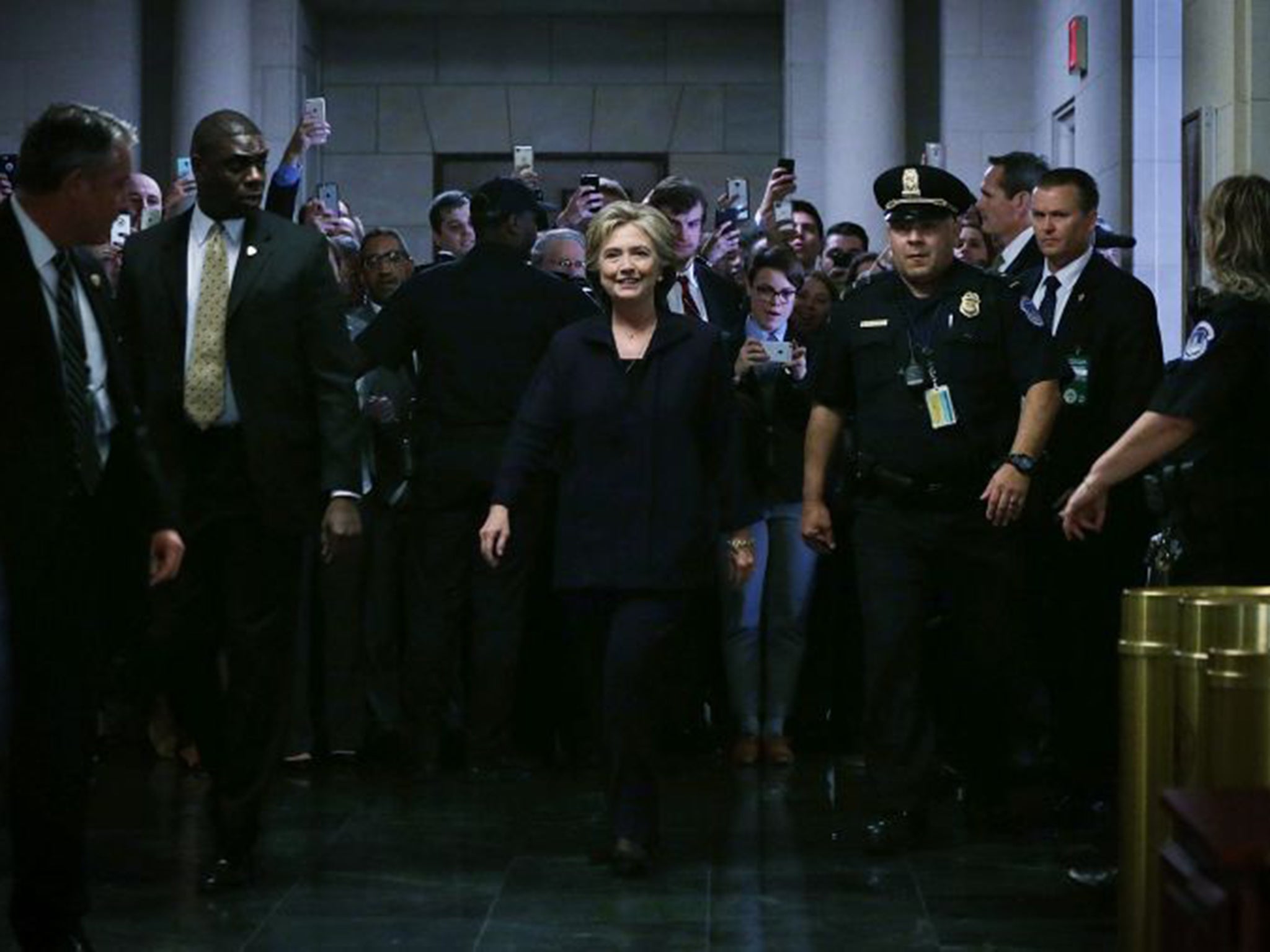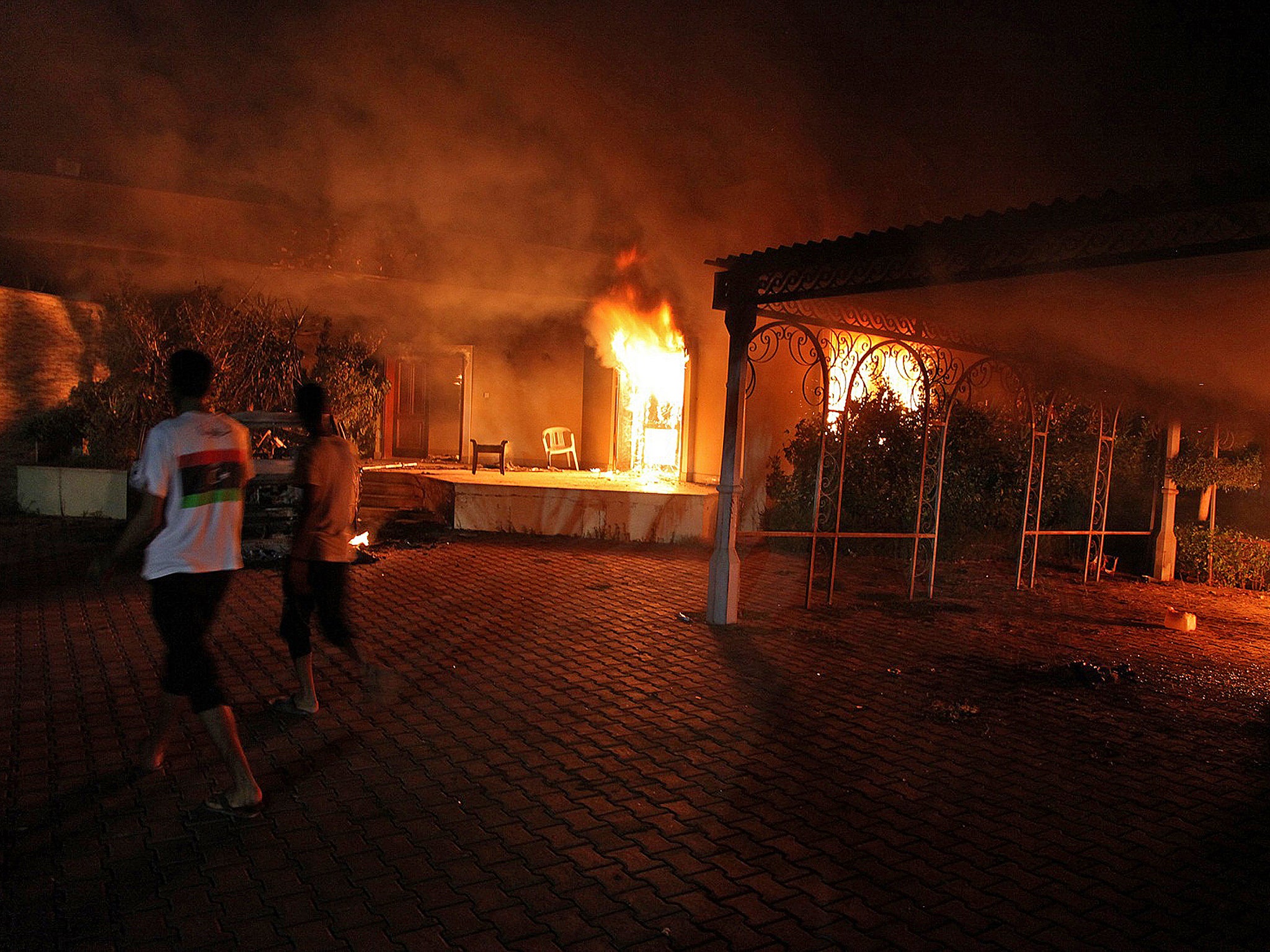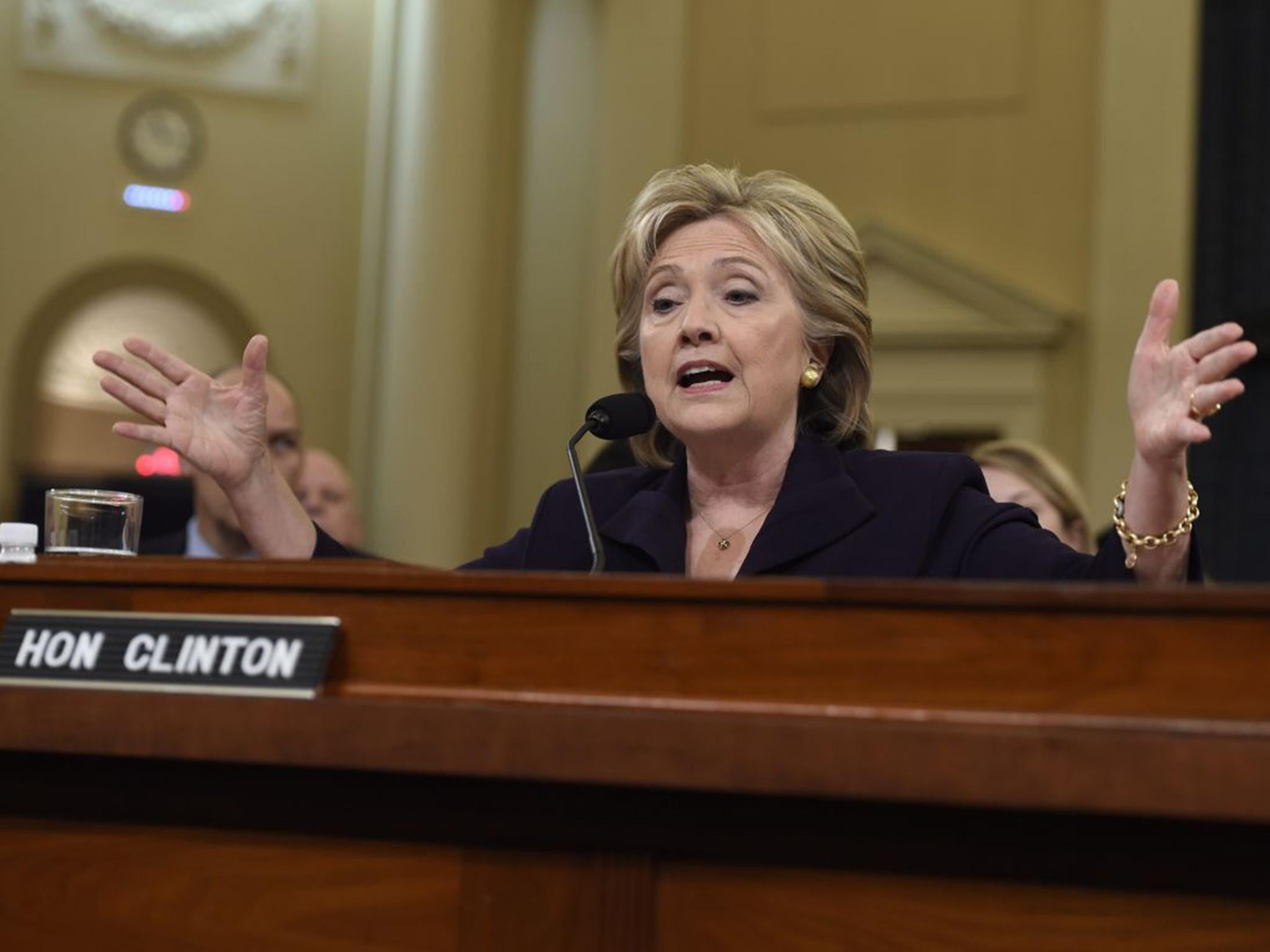Benghazi: Hillary Clinton is guilty, but not as charged
There is a strong case against Clinton’s actions in Libya, but they relate to her support for the overthrow of Muammar Gaddafi in 2011


Your support helps us to tell the story
From reproductive rights to climate change to Big Tech, The Independent is on the ground when the story is developing. Whether it's investigating the financials of Elon Musk's pro-Trump PAC or producing our latest documentary, 'The A Word', which shines a light on the American women fighting for reproductive rights, we know how important it is to parse out the facts from the messaging.
At such a critical moment in US history, we need reporters on the ground. Your donation allows us to keep sending journalists to speak to both sides of the story.
The Independent is trusted by Americans across the entire political spectrum. And unlike many other quality news outlets, we choose not to lock Americans out of our reporting and analysis with paywalls. We believe quality journalism should be available to everyone, paid for by those who can afford it.
Your support makes all the difference.Hillary Clinton was battered for 10 hours on 22 October by Republican Congressmen seeking to blame her for security failings, when she was secretary of state, that led to the murder of United States ambassador Christopher Stevens in the US consulate in Benghazi on 11 September 2012. The Republican purpose in grilling her for so long was a blatant attempt to throw enough mud and make enough insinuations to damage her bid for the presidency. The manoeuvre is wholly cynical, but polls show that it is having an impact on her popularity, if only because it is always possible to throw more accusations than can be rebutted by the accused, however innocent they may be.
Of course, there is a strong case against Clinton’s actions in Libya, but they relate to her support for the overthrow of Muammar Gaddafi in 2011 and not the death of Christopher Stevens in 2012. There is no doubt that she played a crucial role, along with President Barack Obama’s advisers Samantha Power and Susan Rice, in the decision by the US to intervene on the side of the anti-Gaddafi rebels. Although France and the UK played a more public role, the US termed its strategy as “leading from behind”. Clinton was proud of her action, proclaiming in October 2011 after the killing of Gaddafi: “We came, we saw, he died.” She said during the recent Democratic presidential candidates’ debate that what she did in Libya was “smart power at its best”.

Neither Clinton nor the Republican Congressmen showed much interest in the present calamitous state of Libya, which is divided into fiefdoms ruled by criminalised warlords reliant on terror and torture. Benghazi is partly in ruins and is fought over by rival factions, while Islamic State has carved out enclaves where it decapitates Egyptian Copts and Ethiopian Christians. Nato’s military intervention in 2011 was justified by the claim that Gaddafi was about to massacre the people of Benghazi, which cannot be proved or disproved because it never happened. What is more certain is that, if the old regime was still in power, several thousand migrants from north and west Africa would have jobs on Libyan building sites instead of sailing from Libyan beaches and drowning in the Mediterranean.
Nor was the disastrous outcome as unpredictable as its protagonists now pretend. One of the first policies announced in 2011 by the incoming Libyan transitional government was an end to Gaddafi’s ban on polygamy. When a Libyan journalist interviewed a campaigner for women’s rights about wearing the veil a couple of years ago, the Libyan Grand Mufti issued a fatwa against him and his television station claiming that they were “promoting the apostate Shiite doctrine and atheism and defaming Islam”.

Although Clinton would have been an easy target due to her significant contribution to the disintegration of Libya, her Republican critics avoided the issue. After all, the UN Security Council, Nato, US allies such as David Cameron and Nicolas Sarkozy, and many senior Republicans in the US had applauded military intervention in Libya and would have to take a share of the blame. The political figure who seems to have had the most doubts about becoming involved in Libya was President Obama, who predicted that it might all end unhappily and was only just persuaded to sanction it by Clinton, Power and Rice. Even then, Obama was under the impression that he was backing a humanitarian mission to save the people of Benghazi rather than an all-out effort to achieve regime change. He forecast that any such attempt in Libya would produce a situation similar to Iraq and this is exactly what has happened.
Neither Clinton nor her Republican critics show any real interest in events in Libya in 2011 or in the following years. Their attitude is a perfect example of the degree to which the domestic political priorities of Washington dictate and distort perceptions of developments abroad. This is particularly true of Libya where the Western media was at one in supporting the war in which the brave insurgents would topple the evil dictator Gaddafi and introduce secular democracy. Of course, the perpetrators of these disasters have the advantage that Libya is now so dangerous that few journalists go there to describe the results of the handiwork of the hawks of 2011.
The Republican majority on the House Benghazi select committee, who have spent 17 months and $4.5m (£2.9m) on their partisan persecution of Hillary Clinton, should be more interested in what the US was doing in Benghazi and eastern Libya in 2011 and 2012. It would be useful to know how, what was sold as a humanitarian air campaign to save the people of Benghazi, turned into a successful effort to overthrow Gaddafi.
But there are also important questions to be asked about what was going on in the US Consulate and CIA station in Benghazi in the months leading up to the attack on them by Islamists three years ago.
In April 2013, the famed US investigative journalist Seymour Hersh published in the London Review of Books an account of what the CIA calls a “rat line” which was created in early 2012 “to funnel weapons and ammunition from Libya via southern Turkey and across the Syrian border to the opposition”. This was the result of an agreement between the US, Turkey, Saudi Arabia and Qatar to equip the armed Syrian rebels, and much of this weaponry ended up with jihadis affiliated to al-Qaeda. Hersh says that an account of what happened in setting up of the “rat line” is in a highly classified unpublished section of the Senate Intelligence Committee’s report into the death of Mr Stevens in Benghazi which was issued in January 2013.
Under the terms of a secret agreement between the US and Turkey, partly funded by Saudi Arabia and Qatar, arms from Gaddafi’s arsenals were procured in Libya by retired US soldiers through Libyan front companies, with the operation overseen by the CIA and MI6. Normally, the CIA should have reported what it was doing to Congress, but an exception is made for liaison missions and “the involvement of MI6 enabled the CIA to evade the law by classifying the mission as a liaison mission”. Hersh cites a former intelligence officer as saying that the only purpose for the US to keep open a consulate in Benghazi “was to provide cover for the movement of arms”. After the murder of Mr Stevens, the CIA abruptly ended the operation which then came under Turkish control.
The story would explain a relationship between the CIA and jihadis in Benghazi that might have led to the Americans being over-confident that they were safe from attack. Western governments have largely blamed Turkey, Saudi Arabia, Qatar and the Gulf monarchies for arming the jihadi opposition in Syria, but the “rat line” shows the complicity of Western intelligence agencies.
Join our commenting forum
Join thought-provoking conversations, follow other Independent readers and see their replies
Comments